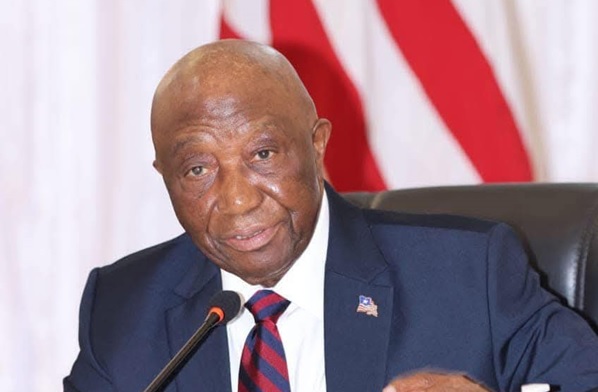Liberia’s ongoing battle with corruption remains a considerable challenge, as highlighted in Transparency International’s 2023 Corruption Perceptions Index (CPI). Released earlier this month, the report gave Liberia a score of 25 out of 100, ranking it 145th out of 180 countries surveyed. This represents a one-point decline from 2022, signaling the continued entrenchment of corruption in the country’s governance structures.
Despite over two decades of efforts to combat corruption, Liberia remains one of the most corrupt nations in the world. Anti-corruption advocates point to the absence of a clear legal framework that defines corruption as a punishable crime, a gap in the legal system that exacerbates the problem.
The 2024 CPI report places Liberia among the most corrupt nations globally, with scores well below the regional average of 33 for sub-Saharan Africa. This continues a troubling trend, as Liberia’s corruption score lags significantly behind regional leaders like Botswana, which scored 71, marking a stark contrast in governance and institutional integrity.
The failure to make substantial strides in fighting corruption has substantial implications for Liberia’s governance and its ability to attract foreign investment. The ongoing systemic corruption within government institutions continues to undermine the country’s efforts to develop a stable economy and provide essential public services.
The 2024 CPI report serves as a clear call to action for Liberia’s leadership led by President Joseph Nyuma Boakai. With increasing international scrutiny and the erosion of public trust in government institutions, it is evident that Liberia must prioritize tackling corruption to ensure its democratic institutions remain functional and to foster sustainable development.
Civil society organizations and anti-corruption advocates have long called for a more robust approach to addressing the issue, including strengthening legal frameworks, increasing the independence of oversight bodies like the Liberia Anti-Corruption Commission (LACC), and ensuring greater accountability for public officials. Despite these calls, the political will to fully address Liberia’s corruption crisis has been lacking, with corruption remaining embedded in many sectors, from law enforcement to education and public administration.
The government’s failure to enact effective reforms has led to a sense of disillusionment among Liberians, many of whom feel that their leaders are not adequately addressing the problem. The 2024 CPI score is a reminder that Liberia must take more decisive and meaningful action to address corruption and improve governance.
Critics argue that previous administrations, including that of former President Ellen Johnson Sirleaf, lacked the political will to tackle the issue effectively. Numerous cases of corruption surfaced during her presidency, with high-ranking officials, including the Auditor General and heads of key agencies, dismissed or suspended for misconduct. Despite public revelations of bribery and extortion involving police officers, judges, and other public officials, very few cases were prosecuted, and even fewer resulted in convictions. In her final state of the nation address in 2017, Sirleaf acknowledged the pervasive nature of corruption, admitting that her administration had not succeeded in eradicating the issue.
Under the current administration of President Joseph Nyuma Boakai, Liberia’s corruption crisis persists. The Center for Transparency and Accountability in Liberia (CENTAL) has urged Boakai to take decisive action to address the country’s declining CPI score. CENTAL emphasized in a press conference on Monday, December 9, 2024, that although the low score reflects the deeply entrenched corruption in Liberia, it also presents an opportunity for transformative leadership.
Corruption in Liberia is pervasive across various sectors. A 2013 report by Human Rights Watch pointed to police misconduct as a major concern, with citizens reporting being forced to pay bribes for basic services like filing cases or retrieving confiscated goods. Police officers, in turn, cited low salaries and pressure to bribe superiors for promotions, creating a cycle of exploitation and corruption within the force.
The education sector is similarly compromised, with reports of “sex for grades,” teacher absenteeism, and embezzlement becoming alarmingly common. Efforts to curb these abuses, such as the establishment of anonymous reporting systems, have had limited success due to the widespread culture of silence and fear of retaliation.
The release of Transparency International’s CPI report not only highlights Liberia’s governance shortcomings but also positions the country in a global context. While the average CPI score for sub-Saharan Africa is 33, Liberia’s score of 25 is significantly lower, reflecting a poor performance compared to regional leaders such as Botswana, which boasts a score of 71.
The consequences of persistent corruption extend beyond Liberia’s international reputation. Mismanagement and the abuse of public resources undermine the country’s ability to attract foreign investment, deliver essential public services, and achieve sustainable development.
Anti-corruption advocates argue that addressing Liberia’s corruption crisis requires a comprehensive, multifaceted approach. Strengthening the LACC through increased funding, enhanced personnel capacity, and prosecutorial independence is critical. Furthermore, lawmakers must enact laws that explicitly criminalize corruption, and stronger accountability mechanisms must be put in place to hold government officials to account for their actions.
Additionally, there is a pressing need for the government to actively engage civil society organizations and the international community in promoting greater transparency and accountability. CENTAL’s call to action resonates with many Liberians who believe that President Boakai’s administration has a unique opportunity to lead the nation toward meaningful reforms.







